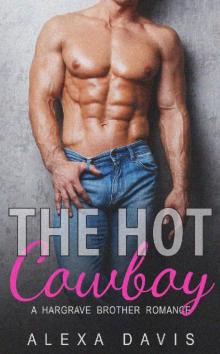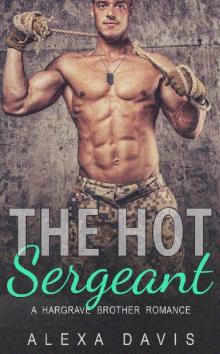- Home
- Alexa Davis
The Hot Brother (Romance Love Story) (Hargrave Brothers - Book #5)
The Hot Brother (Romance Love Story) (Hargrave Brothers - Book #5) Read online
THE HOT BROTHER
By Alexa Davis
This book is a work of fiction. The names, characters, places and incidents are products of the writer's imagination or have been used fictitiously and are not to be construed as real. Any resemblance to persons, living or dead, actual events, locales or organizations is entirely coincidental.
Copyright © 2017 Alexa Davis
From the Author
I hope you enjoy The Hot Brother. If you want to get an email as soon as my next book is published then click here. I’ll also include you in all the giveaways I do automatically.
Click Here To Read The Hot Cowboy (Hargrave Brother #1)
Click Here To Read The Hot Sergeant (Hargrave Brother #2)
Click Here To Read The Hot Gamer (Hargrave Brother #3)
Click Here To Read The Hot Lawyer (Hargrave Brother #4)
Get my never released free book Tempting for a limited time.
Click here to get your free book
1. Logan
The truck jerked and rocked over the pitted and potholed surface of the old logging road that led into the backside of the Davy Crockett National Forest. Despite the ache in my backside from the last leg of the almost three-hour drive, I felt freer and more at peace than I had in weeks. The extra hours I’d put in while George was getting accustomed to being the father of a sweet but loud newborn were about to pay off. Little Colleen, named after our grandma, had also apparently, inherited a fair sense of timing, only screaming when George had finally closed his eyes, no matter what time of day it was.
After a couple of weeks narrowly catching some bad calls my older brother made from sheer exhaustion, we’d both agreed it was best if I just ran it all for a little while. For the next month, George went home and played Mr. Mom while I babysat our employees as they built an office building near downtown Austin.
I glanced down at the camera bag bouncing on the seat next to me. I was more excited than I’d admitted to George about photographing the Davy Crockett National Forest. I’d been all over the plains and desert parts of Texas. The only trees I’d gotten on film since I’d been back Stateside had been the ones between the ranch house and the lake, back on the Lago Colina ranch. I loved the family homestead, but after spending years chasing the perfect photo opportunity all over the world, it was a little underwhelming to take pictures of my own backyard.
The turns in the road tightened, and I slowed down even more, to give my old truck a chance at surviving the trek. The shadows deepened over the road as I entered the forest itself and the trees arched over the truck in a lush, green canopy rare to find in a desert state.
I glanced in the rearview mirror at the tarp over my camping gear and grinned to myself. I’d been working with my brother for so long, I’d almost forgotten how to pack my gear properly and had to repack it to get the extra trail cameras in. Those trail cameras, I hoped, would be a door to the next phase of my work as a photographer.
I’d traveled the world in search of perfect moments to capture. Now, I had the opportunity to capture wildlife without interference from man at all, and help an old friend while I was at it. Boyden Grimness was the meanest, grizzled old rancher stereotype anyone could imagine. You’d never believe he was a conservationist. He cared for his land as a cattleman, but he cared about everything else that lived on it, not just sheep and cattle.
He’d given me cameras, gear, and one directive: document how many different species of animals and birds were affected by the new boundaries of the forest. New roads, more logging, and more people meant more carcasses by the side of the road. But not every animal affected died there. Some were orphaned young; others were too lean for the normal bounty of spring. I was looking for something more out of life. I didn’t want to spend the next twenty years telling guys not to kill themselves or waste my materials on stupid mistakes. Which was, essentially, what I did for a living.
Not that it was a bad living to make. George had taken me on as a full partner. I hadn’t given him one cent for the honor, and I’d been making more in a month than I made in six on the road, sometimes. But I missed the adventure of flying to a new country and not knowing where I’d stay. I’d been forced to meet new people and come out of my shell in a big way. It was hard to be shy if that also meant you might have to go hungry or be stranded out in the middle of a guerilla war zone.
Now that I was back home, I’d started retreating into my old habits. After all, I had a nine-to-five and coworkers now, but I never went out for drinks. I missed feeling connected to something, so I headed out into the woods alone. I had to make a change, and fast. I just needed to figure out how to do it without pissing off my brother. Once upon a time, I would’ve just hopped on a plane and apologized from Dubai or Brazil once I landed. But our family had changed so much, and I didn’t want that relationship with them anymore.
Daniel and Rachel had been parents for about a week. Due to some unwise travel choices, I had to get a vaccine booster before I could even go meet my nephew. George and Callie had their little girl, who was starting to smile and recognized me when I walked in the room, and Tucker’s step-daughter, Olivia, played with my hair whenever they visited. I’d gone online and bought my own hair supplies, just to put an end to “Uncle Logan’s pink princess hair.”
I knew I couldn’t have kids. I could barely take care of myself long term. But I loved my brothers’ kids more fiercely than I thought you could love anyone. They were the next generation of Hargraves. Somebody had to teach them how to properly recycle on a camping trip, how to track animals, and where to hide to take pictures that looked almost more real than their models.
The road ahead of me had gotten more overgrown with brush from the forest. It was heartening to see the forest fighting back, but I knew it was a losing battle. Until the men who could make money by skimming off the edge of the national park had moved on, the forest and its inhabitants would suffer.
I found a place to park the truck and grabbed my knapsack from the backseat. I was nervous about leaving my camera equipment behind. But I’d buried it under unimportant things almost no one would be caught stealing. There wasn’t much more I could do until I found a campsite and set up for the night. One last quick equipment check, then I bungeed my tent to the bottom of the old green backpack I’d picked up a decade ago at an army surplus store. My old Nikon D5 DSLR went around my neck, and I made my way into the dense greenery of the Davy Crockett National Forest.
The hike started so easy, I wondered if I’d parked too far down the hill. It didn’t take long, though, to find a nice, wide trail that wound up toward the only hill in the park. I’d read that the entire park was made up of flat plains and gently rolling hills. But at the top of the Neche lookout hill, there were a few campsites that overlooked the Neches River. I wanted to set up my first camera near the water, for the diversity of wildlife that would travel along the banks.
After less than an hour hiking in, I found the campsite I was looking for. At the top of a gently sloping hill, there was a shelf of rock that stretched out and became a cliff overlooking the river. It wasn’t high enough to see very far in any direction, but the plain stretched out beyond the river, giving an amazing line of sight for over 180 degrees.
I set up the pup tent and put most of my gear inside, taking only my water canteen and my camera. The canteen was clipped to my belt, the camera around my neck. At the last second, I decided to take some trail marking tape, too, and I put together a grab bag with the tape, a couple of granola bars, and a knife, which also clipped to the canvas belt.
As I w
alked, I cut strips of the red marking tape and tied them off to tree branches at intervals all the way back to the truck. That way, if I did get disoriented, I could use the markers to find the path again. Two hours and two trips to the truck later, my tent was too full of camera equipment to sleep comfortably, and I had just one trip left to the truck, for my extra water. I wasn’t excited about hauling the six gallons of water back through the woods, but as hot as the day was getting, it wasn’t all going to make it to the campsite, anyway.
The sun was high in the sky, getting close to its apex, and my stomach loudly and painfully reminded me that granola bars were not enough to keep me going for much longer. However, they were all I had in my grab bag, so I set the hunting blinds I was carrying down and leaned against a tree to rest. I’d been there less than a minute when I heard bleating coming from behind me.
Nervous that I’d stumbled on a coyote kill, I realized I hadn’t bothered to bring my gun with me back down the hill. The bleating continued, and my curiosity wouldn’t leave it alone. I left my load of water just off the path and pushed my way through the undergrowth until I saw a doe, pacing back and forth near the source of the sound. The bleating continued, and I realized it was probably a wounded, dying fawn. I turned to go, when the mother stopped pacing and stared at me. She didn’t bolt; she just stared right at me, as if she were trying to communicate with me.
Oh, honey. I can’t help you. I’m sorry. I didn’t know the first thing about wild animal first aid. I may have been raised on a ranch, but I’d always hated the sight of animals suffering so much I stayed home when my dad and brothers went hunting every year. Hell, even my computer genius younger brother, Jackson, had gone hunting.
Then I remembered the Glock 9 mm in my bag. I’d only brought it for protection, on the chance that something hungry came to visit me while I was sleeping. But as the doe took a single step toward me, her eyes still fixed on my face, I knew what I had to do.
The bleating was incessant and indicated a terrified and injured baby was near where the doe paced. I slowly walked toward the doe and the sound of her baby, marveling that momma stayed put and watched me, the muscles in her flank twitching and trembling as her need to protect her young went to war with her instinct to run and save herself.
Getting closer, I could see some sort of deep ditch carved out by a fallen tree or heavy rain. I talked softly to her, trying to reassure her that I meant her no harm. Her ears twitched at my nonsensical baby talk, but she was almost a statue until I was only about twenty feet away from her. Only then did she back away a few feet and begin pacing again. I made it to the edge of the ditch and looked down. There, a fawn no more than a few days old was struggling in the deep leaves. I made a sound, or he smelled me, and in an instant, he was still, his little, heaving chest the only movement from below.
“Okay, little fella, I’m coming down,” I continued to talk as I slid down the embankment to his side. The ditch wasn’t as deep as it had looked from above, and when I stood in the leaves that littered the bottom from autumns past, the top of the rise was only to my chest. Still, before I could move the little guy, I had to figure out how to get out. After that, I’d worry about how to catch him and not get kicked by him or his worried mother, who looked down on us anxiously.
I walked the length of the crevice and found several fallen limbs that I could stack fairly securely. Then I checked the depth at different points along the side I’d come in on, which seemed a good three or four feet shallower than the side the fawn had slipped in from.
With the wood stacked at the highest point in the ditch, it was only as deep as my thighs. I could easily lift the deer high enough to get him out. With any luck, he wasn’t too badly hurt and could run off to his momma before I even made it out of the hole behind him.
I cooed and murmured to him as I approached, my hands out in front of me. He froze, his eyes so wide I could see the whites of them. Above me, the doe started chuffing her dismay and fear.
“Just a little more, you guys, we’re almost done, and you never have to see me again if you don’t want to,” I said in my “reassuring” voice. I slid my hand along the fawn’s tiny face and down his neck, and when I reached his shoulder to lift, my hand slipped through something wet and a little sticky. Deflated, I found my hand was slick with the fawn’s blood.
“Well, shit, son. What we gon’ do now, huh?” I mentally scanned the items in my bag—knife, trail tape, park map, gun, granola bars. With a sigh, I considered the gun.
But the little face that looked up at me begged me not to hurt him, and I relented to my lifelong mantra of, “Do what you will, only harm none.” Not that I’d always kept that, but bullies and drunks were not the same thing as a helpless baby, and I’d never killed another human or four-legged creature in my life.
Without much hope, I checked the park map for the closest ranger station. It was only four or five miles. An easy hike, but too far to walk with my arms full of a baby they’d likely just shoot when I got there. But the truck sat less than a fifteen-minute hike out of here. That, I could do. I took off my favorite old denim shirt and tore it into wide strips, cutting where the seam made it too hard to rip.
I folded some of the strips into a pad and pressed it to the place where the blood felt like it was gushing as he struggled. Then I tied the rest around his body to hold it in place. The whole thing looked bloody when I was done, from my hands and from the fawn’s frantic spurts of movement. Still, it held when he moved, and his movements were already getting less frantic, slower. I realized that was more likely from loss of blood than recognizing me as helping. He was fading, and I still had to get him out of here and find help. I lifted him into my arms, and he laid his head on my shoulder, as if to tell me he just couldn’t fight anymore.
Unmanly tears stung my eyes, and I pressed my cheek to his face, sniffling, as I stood with him in my arms. He should have weighed almost ten pounds, but as he collapsed in my arms, it felt like he only weighed half that. He was so still and quiet as I tried to climb out of the ditch with my arms full, all I could feel was his heart beating fast against my chest.
I managed to get enough height on a jump that my ass landed on the ledge, and I could wriggle and slide out. As I got to my feet and started to run toward my truck, I was grateful for the years of mountain climbing and trail running that made running through the forest easier. But I was afraid that thready heartbeat was going to stop before I could get to help. I pushed myself to run faster than I ever had over an uneven trail before, praying to God to keep my legs steady and my feet sure, so the little animal wouldn’t die.
I made it to the truck and asked the fawn to please not panic as I slid him into the back seat of the cab. I laid him in the middle of the seat, bandaged side facing up. What had once been blue denim was now purple from blood, and the fawn barely raised his head when I laid him down on the seat. I moved the front seat back to eliminate the possibility of him sliding off and climbed in behind the wheel.
I’d never been so frustrated as I was trying to navigate the deep potholes and ridges in the gravel road without hurting the fawn. I drove as fast I as dared, but the drive still took twenty long minutes to get back to paved road. After that, it was less than ten, and I was pulling up to the visitor’s center, honking my horn at the patrons who sauntered through the parking lot. There were people milling around everywhere, unconcerned and looking forward to an enjoyable day in the forest. I wished I was still one of them. I gently lifted the fawn out of the back seat, nearly crying when he lifted his head slightly and his little tongue flicked out at me, as if he thought I might have food.
The building was within reach, if my little guy would just hold on. I put on a last burst of speed, and ran full out, bellowing for help as I hit the door and threw it open with my shoulder.
2. Heidi
It was certainly not a special day when I awoke that morning. The sun wasn’t up yet, but my alarm clock screamed at me to get up until I rolled out of
bed and crossed the room to turn it off. I wanted to go back to sleep, but I was up, and that meant it was time for my run. I hated running. I hated mornings. About all I wanted was a cup of hot coffee and some time to surf Instagram before I had to work. That’s why the stupid alarm clock was ten feet from my bed.
I ran my bare minimum, only about seven miles, then started the coffee machine while I showered and dressed. I didn’t usually bother with makeup, but my shorter run left me time to add a little eyeshadow and blush to my usual regime of moisturizer and mascara. The bronze on my eyelids made my hazel eyes look greener, and the mascara darkened my auburn lashes so they were visible. Even I had to admit my face wasn’t terrible to look at, once I had some makeup on.
My coffee went in my favorite red travel mug, and I grabbed my fanny pack and hat. The ranger uniform wasn’t flattering to any female figure, but I managed to fill out the top and the army-green jacket covered the worst part of the waistline. I glanced in the mirror and smiled to myself. Strangely enough, the shade of the uniform accentuated my coloring, and if the fit hadn’t screamed “menswear,” I would have felt pretty.
The visitor’s center was quiet when I arrived, but one of the trucks was missing. Eli had probably just gone straight out to check campsites, leaving me to deal with early morning hikers and getting the register ready at the gift shop. I was the only female ranger in the park, and that meant I was left to deal with what the other guys thought of as “girl work” more often than not. I prepped the center and flipped the sign to open and set out a reminder sign for hikers so they’d register with us. Because the park wasn’t on a mountain, people often thought that meant there was no danger for them out there. The blood-soaked man who burst into my life a few short hours later would’ve disagreed.
It was late morning when he hit the door at a full run, calling for help. He looked in a bad way, carrying a fawn that looked more like a pile of bloody rags than a deer, as people scattered ahead of him. Several cursed him for being rude or gasped as they saw his cargo and leaped out of the way. I rushed to his side and grabbed him by the shoulders, the only available body part that wouldn’t get me sued. Steering him back through a swinging door marked employees only, I started asking questions, but he seemed in shock and didn’t answer. I escorted him to our triage room, a sterile, white space filled with first aid supplies and rescue gear.

 Billionaire's Nanny (A Billionaire Romance)
Billionaire's Nanny (A Billionaire Romance) The Hot Cowboy (Western Romance Love Story)
The Hot Cowboy (Western Romance Love Story) The Hot Sergeant (Second Chance Military Romance) (Hargrave Brothers - Book #2)
The Hot Sergeant (Second Chance Military Romance) (Hargrave Brothers - Book #2) Stingray Billionaire: The Complete Series (An Alpha Billionaire Romance)
Stingray Billionaire: The Complete Series (An Alpha Billionaire Romance) Dangerous In Love
Dangerous In Love Screwing The Billionaire - A Standalone Alpha Billionaire Romance (New York City Billionaires - Book #1)
Screwing The Billionaire - A Standalone Alpha Billionaire Romance (New York City Billionaires - Book #1) Billionaire's Flight (Standalone Book) (Billionaire Bad Boy Romance)
Billionaire's Flight (Standalone Book) (Billionaire Bad Boy Romance) Under His Control (An Alpha Billionaire Romance)
Under His Control (An Alpha Billionaire Romance) The Hot Brother (Romance Love Story) (Hargrave Brothers - Book #5)
The Hot Brother (Romance Love Story) (Hargrave Brothers - Book #5) The Hot Lawyer (A Romance Love Story) (Hargrave Brothers - Book #4)
The Hot Lawyer (A Romance Love Story) (Hargrave Brothers - Book #4) Sleeping With The Billionaire - A Standalone Royal Alpha Billionaire Prince Romance (New York City Billionaires - Book #2)
Sleeping With The Billionaire - A Standalone Royal Alpha Billionaire Prince Romance (New York City Billionaires - Book #2) The Hot Gamer (A Romance Love Story) (Hargrave Brothers - Book #3)
The Hot Gamer (A Romance Love Story) (Hargrave Brothers - Book #3) Baby By The Billionaire - A Standalone Alpha Billionaire Secret Baby Romance (New York City Billionaires - Book #3)
Baby By The Billionaire - A Standalone Alpha Billionaire Secret Baby Romance (New York City Billionaires - Book #3)